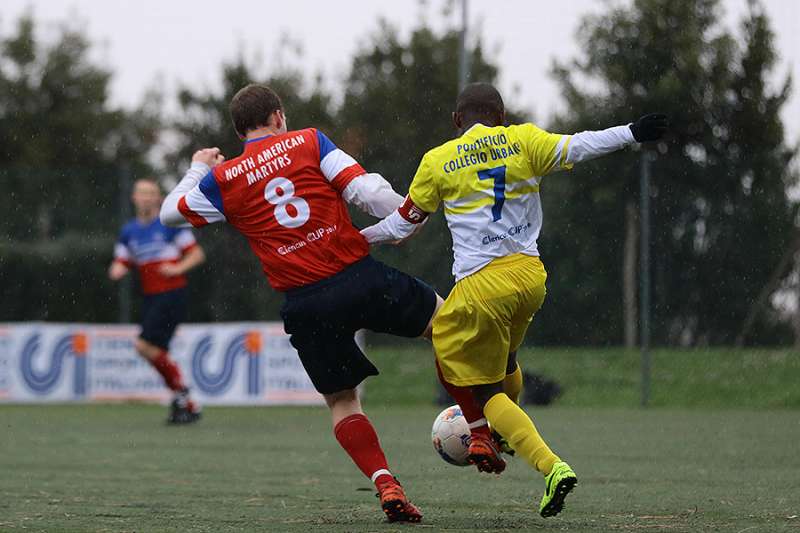For the first time in five years, seminarians and student priests from the North American College in Rome will hit the soccer field to battle it out for the winning title in the city’s holiest tournament — the Clericus Cup.
An annual soccer tournament among the priests and seminarians of Rome’s pontifical universities, the Clericus Cup started in 2007. In 11 years, the North American College has been in the semi-finals six times, even snagging first place back-to-back in 2012 and 2013.
But since then, the North American Martyrs have fallen short of the final four. Until now, when they have the opportunity for redemption May 26 in a face-off against the reigning champs, the Pontifical Urban University.
It has been long enough since 2013 that none of the team’s 25 or so players, even the most senior, have witnessed a tournament win for the Martyrs.
Making it to the final “is exciting,” said Fr. Timothy Wratkowski, a fifth-year student from the Archdiocese of St. Paul-Minneapolis. A defensive player, he said it is great to see “the last five years come together. We view it as a really fun opportunity.”
Team coach, Deacon Drew Olson from the Diocese of Madison, said the key difference this year is a talented crop of new players from this year’s first-year students. Starter Paul Floersch, who is studying for the Archdiocese of Omaha, was identified as one of the team’s most valuable players.
But Wratkowski said that in general they have all grown as soccer players in the last year, increasing communication and mutual support among each other.
Another “tweak” the Martyrs made this year was adding a short spiritual reflection before the start of practices to connect “the spiritual life to what we’re doing as a team,” said Will Nyce, a third-year seminarian and team captain.
“But you have to back that up with nature,” he continued, laughing, “so we ran more this year too. I think we’re more in shape.”
Earlier in the season, the North American Martyrs lost 2-1 in a match against the Urbaniana, so Saturday’s game is likely to be close. Hailing largely from African countries, the other team fields very fast, very technically skilled attackers, so the game will be a challenge for the Martyr’s defense, Olson said.
They will also have to be careful not to “lose the mental game” if referee calls do not go their way.
The Martyr’s pre-game rituals this year have included Morning Prayer together at the college and “American pump-up music” on the way to the field. As one of the few teams with players all from the same country, Clericus Cup organizers also let them play the American national anthem before the match.
As team captain, Nyce, who studies for the Diocese of Arlington, was part of a group of Clericus Cup representatives who met Pope Francis after the General Audience May 23. He said he told the pope the American seminarians and priests “on the hill” were praying for him. “[The pope] seemed really happy to see us,” he said.
Overall, the past few months of games and practices have been “a wonderful joy, a way to share leisure time together, a way to share something in common and then to get to know guys in the house that we might not know well otherwise,” Nyce said.
Though not a part of formal seminary formation, playing sports can benefit men studying for the priesthood because sports “are a major part of people’s lives,” Wratkowski noted. “In the parish a lot of kids participate in sports… We can be present to them in that [showing them] what it means to be a Christian who plays sports.”
Being on the field can bring out a different side of a person, with all different emotions, from joy to disagreement, he continued. Playing soccer with their brothers in the seminary is a good training ground “to learn how to play in a truly Christian way.”
Nyce said that playing sports is also a way to learn to “enjoy the good things that God gives you in a healthy way. Fraternity, good exercise, health — it is good for our all-around well-being.”
He also pointed out St. Paul’s use of running as a metaphor for the moral life. Sports require “discipline, teamwork and giving of yourself for a goal that’s greater than yourself,” he said, something priests “are called to do for our brothers and sisters.”

